人教版八年级下册 Unit9 Have you ever been to a museum?SectionA 3a-3c 课件(共30张PPT)
文档属性
| 名称 | 人教版八年级下册 Unit9 Have you ever been to a museum?SectionA 3a-3c 课件(共30张PPT) |
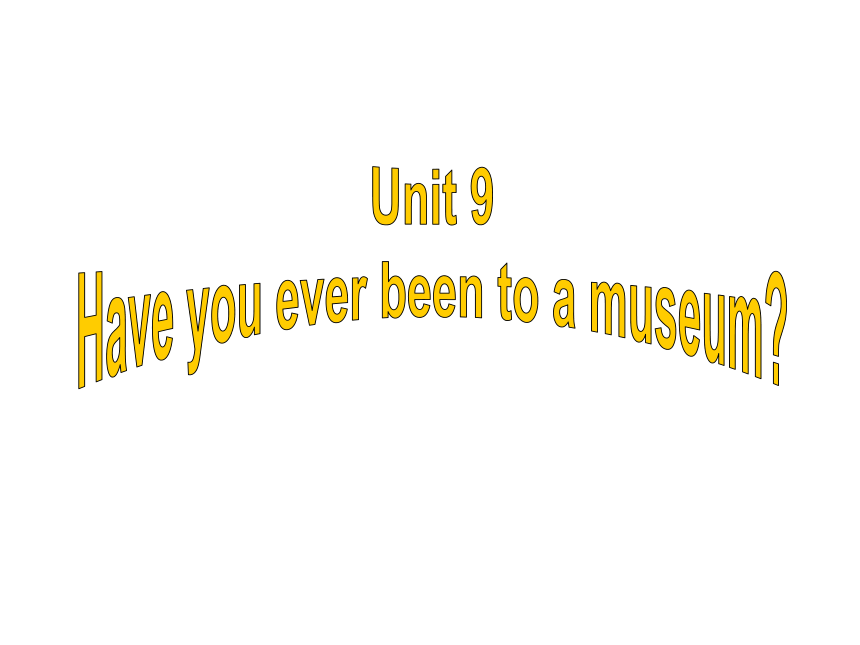
|
|
| 格式 | ppt | ||
| 文件大小 | 5.0MB | ||
| 资源类型 | 教案 | ||
| 版本资源 | 人教新目标(Go for it)版 | ||
| 科目 | 英语 | ||
| 更新时间 | 2023-03-19 00:00:00 | ||
图片预览


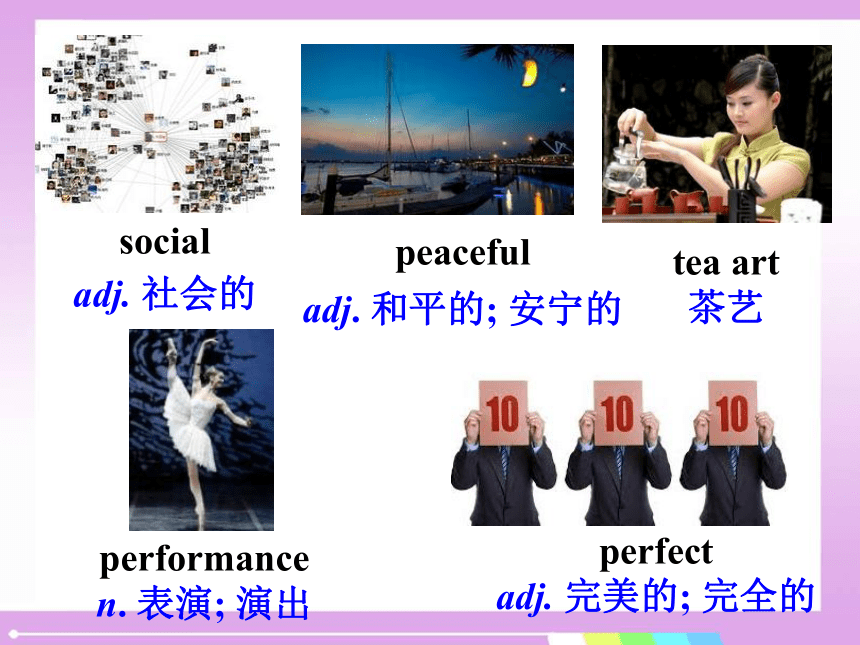
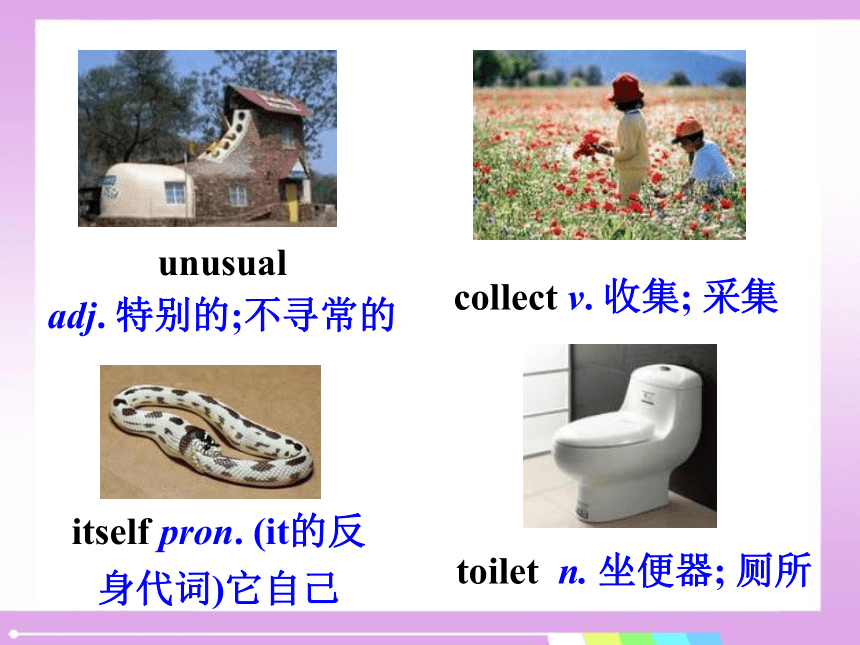

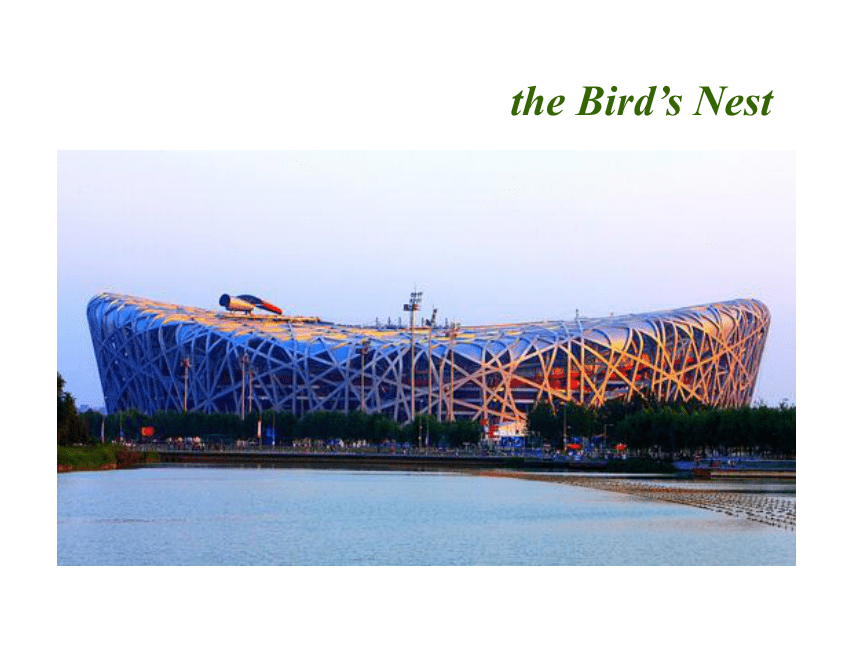
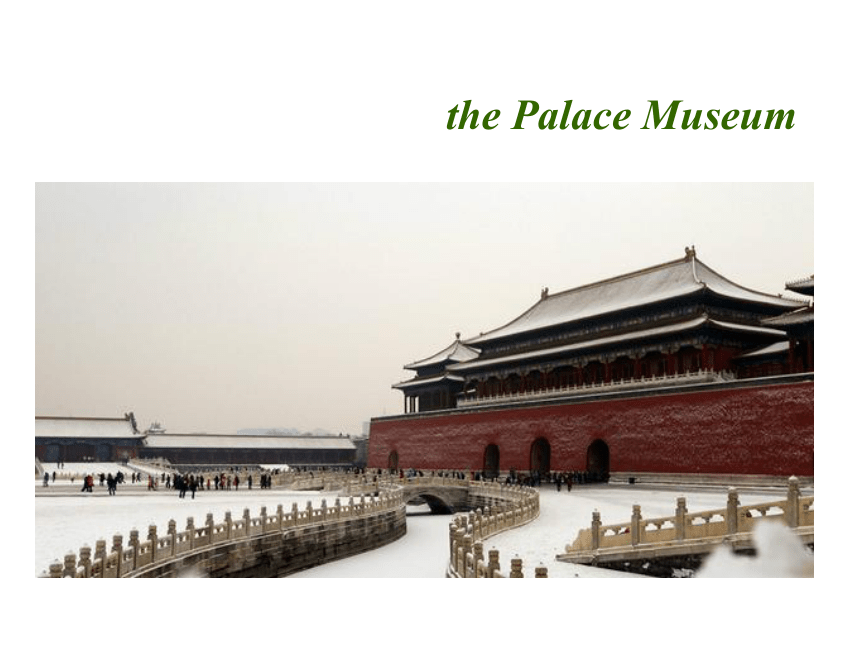
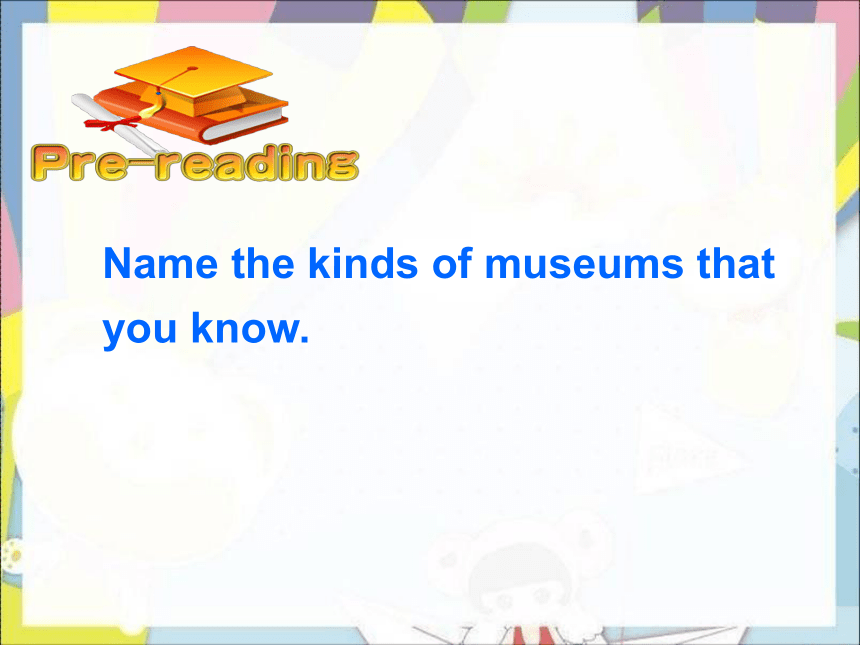
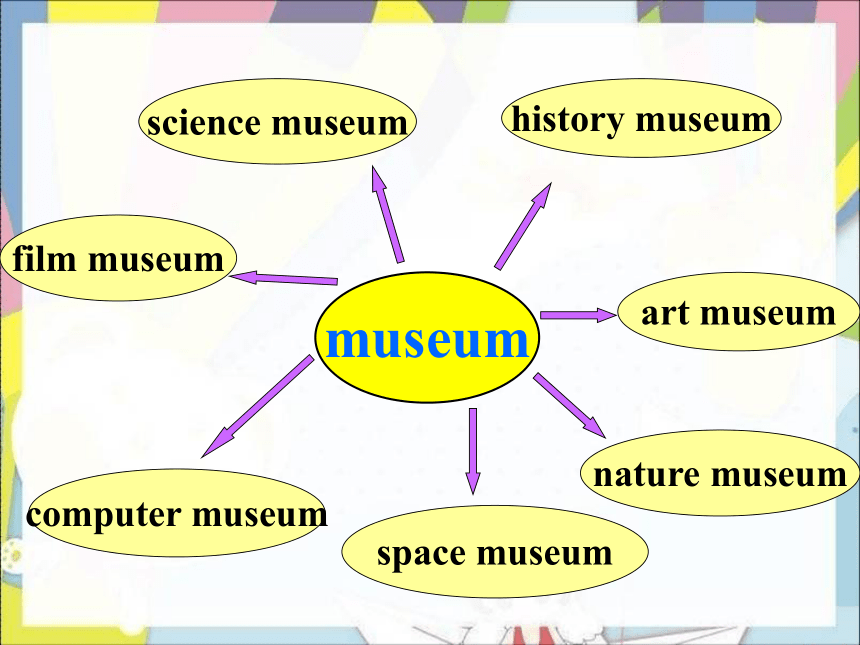
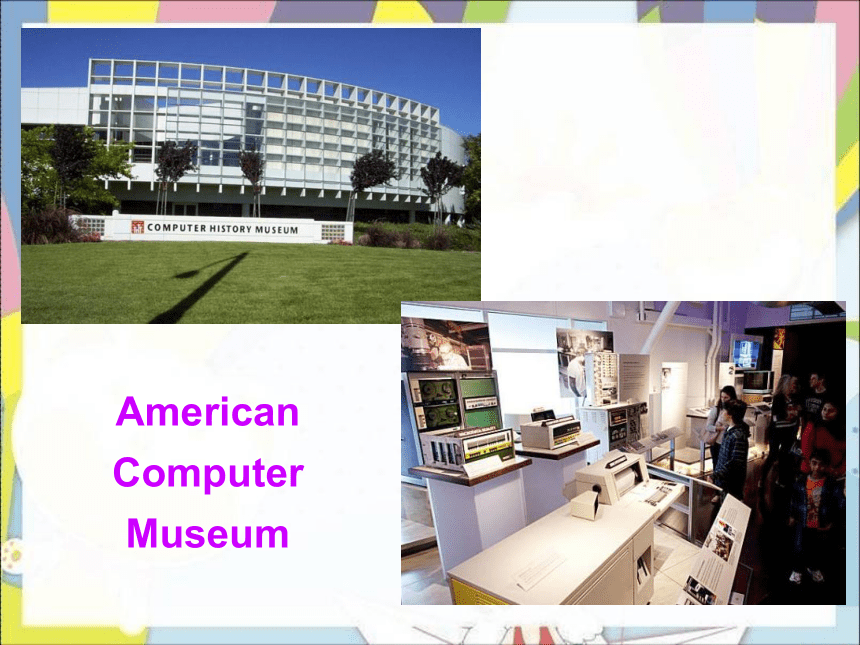

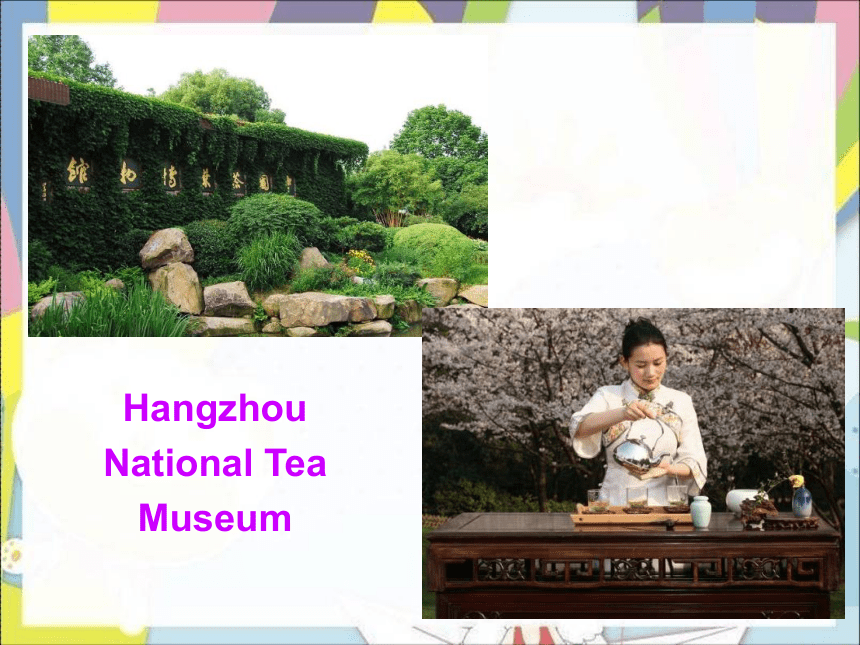
文档简介
(共30张PPT)
invent
v. 发明; 创造
unbelievable
adj. 难以置信的; 不真实的
progress
v.& n. 进步; 进展
rapid adj. 迅速的; 快速的
tea set 茶具
social
adj. 社会的
peaceful
adj. 和平的; 安宁的
performance n. 表演; 演出
perfect
adj. 完美的; 完全的
tea art
茶艺
itself pron. (it的反身代词)它自己
collect v. 收集; 采集
toilet n. 坐便器; 厕所
unusual
adj. 特别的;不寻常的
the Great Wall
Have you ever been to these places
the Bird’s Nest
the Palace Museum
Name the kinds of museums that you know.
museum
history museum
computer museum
art museum
nature museum
science museum
space museum
film museum
American Computer Museum
the International Museum of Toilets in India
Hangzhou National Tea Museum
Read the article and match the words with its meaning.
progress
rapid
unusual
peaceful
improve
invented
make sth. better
become better
uncommon
quiet
made
quick
1. Which three museums do the students
talk about
The American Computer Museum, the
International Museum of Toilets and
Hangzhou National Tea Museum.
2. What does Ken say about the
American Computer Museum
It’s the most interesting museum he has ever been to.
3. What can we learn at the
International Museum of Toilets
We can learn the history and
development of toilets.
4. Why is the Hangzhou National Tea
Museum a nice place to enjoy tea
Because watching the tea preparation with beautiful tea sets is enjoyable.
5.What do you think is the most interesting thing about each museum
1. The most interesting museum I’ve been to is the American Computer Museum.
多音节词和部分双音节形容词最高级加most构成,前面加the。如: the most beautiful girl
2. The old computers were much bigger.
much可修饰形容词比较级,表示……得多。
如: much richer
a little, even, a bit也可以修饰形容词比较级。
3. I wonder how much more computer will be able to do in the future.
我想知道将来电脑还能够做些什么事情呢
1)wonder 表示“ (对某事)感到疑惑;想要
知道;想弄明白;琢磨”,后面常接由what,
how, who 或者if/whether引导的宾语从句。
e.g. I wonder how they’re getting on.
我想知道他们现在过得怎样。
4. It also encourages governments and social groups to think about ways to…
encourage sb. to do sth.
鼓励某人做某事
e.g. My father encouraged me to take
part in the sports meeting.
父亲鼓励我参加运动会。
5. Watching the tea preparation is just as enjoyable as drinking the tea itself.
看沏茶的过程和饮茶本身一样令人愉快。
-able是一个典型的形容词后缀, 可加在动词之后, 表示“可…..的; 能够……的”。此处enjoyable(能使人快乐的; 令人愉快的) 便是一例, 再如:drinkable(可饮用的), washable(可洗的), readable(可读的), usable(可用的; 可使用的)等等。
肯定式 否定式
I/You/We/They have finished the work.
He/She/It has finished the work. I/You/We/They have not finished the work.
He/She/It has not finished the work.
构成:have(助动词) + p.p
has(第三人称单数助动词) + p.p
疑问式 回答
Have I/you finished the work
Has he/she finished the work Yes, you/I have.
No, you/I haven’t.
Yes, he/she has.
No, he/she hasn’t.
have not 常缩略为 haven’t。
has not 常缩略为 hasn’t。
Have you had your lunch yet
Yes, I have. I have just had it. 表示过去发生或已经完成的动作对现在造成的影响或结果。
I have already taught him some English.
John has never been to the space museum.
My boy has just started junior high school. 现在完成时常与时间副词already, never, ever, just, before, yet等连用。
比较:He has been to Beijing.
他曾去过北京。
(人已回来)
He has gone to Beijing.
他已经去北京了。
(人已走)
ever 意为“曾经”,用于疑问句或否定句中,放在助动词与过去分词之间。
e.g.
Have you ever been to Hong Kong
你曾去过香港吗? I haven’t ever spoken to her.
我未曾和她说过话。
have / has been (to) 表示“曾经到过某地”,说话时此人不在那里,已经回来。侧重指经历。
have / has gone (to) 表示某人“已经去某地了”,说话时此人可能在路上或已到那里,不在这里。
I. 根据括号内的要求完成下列各句,每 空一词(含缩写)。
1. My parents have come back already. (改为否定句)
My parents _______ ______ back ____.
2. The boys have been to Japan lots of times. (改为一般疑问句)
_______ the boys _______ to Japan lots of times
Have been
haven’t come
yet
3. Has your sister gone to the bookstore (作肯定回答)
_______, she _______.
4. I have been to the theme park three times. (对划线部分提问)
_____ ______ times have you been to the theme park
5. The movie has been on for half an hour. (对划线部分提问)
_____ _______ has the movie been on
How many
Yes has
How long
invent
v. 发明; 创造
unbelievable
adj. 难以置信的; 不真实的
progress
v.& n. 进步; 进展
rapid adj. 迅速的; 快速的
tea set 茶具
social
adj. 社会的
peaceful
adj. 和平的; 安宁的
performance n. 表演; 演出
perfect
adj. 完美的; 完全的
tea art
茶艺
itself pron. (it的反身代词)它自己
collect v. 收集; 采集
toilet n. 坐便器; 厕所
unusual
adj. 特别的;不寻常的
the Great Wall
Have you ever been to these places
the Bird’s Nest
the Palace Museum
Name the kinds of museums that you know.
museum
history museum
computer museum
art museum
nature museum
science museum
space museum
film museum
American Computer Museum
the International Museum of Toilets in India
Hangzhou National Tea Museum
Read the article and match the words with its meaning.
progress
rapid
unusual
peaceful
improve
invented
make sth. better
become better
uncommon
quiet
made
quick
1. Which three museums do the students
talk about
The American Computer Museum, the
International Museum of Toilets and
Hangzhou National Tea Museum.
2. What does Ken say about the
American Computer Museum
It’s the most interesting museum he has ever been to.
3. What can we learn at the
International Museum of Toilets
We can learn the history and
development of toilets.
4. Why is the Hangzhou National Tea
Museum a nice place to enjoy tea
Because watching the tea preparation with beautiful tea sets is enjoyable.
5.What do you think is the most interesting thing about each museum
1. The most interesting museum I’ve been to is the American Computer Museum.
多音节词和部分双音节形容词最高级加most构成,前面加the。如: the most beautiful girl
2. The old computers were much bigger.
much可修饰形容词比较级,表示……得多。
如: much richer
a little, even, a bit也可以修饰形容词比较级。
3. I wonder how much more computer will be able to do in the future.
我想知道将来电脑还能够做些什么事情呢
1)wonder 表示“ (对某事)感到疑惑;想要
知道;想弄明白;琢磨”,后面常接由what,
how, who 或者if/whether引导的宾语从句。
e.g. I wonder how they’re getting on.
我想知道他们现在过得怎样。
4. It also encourages governments and social groups to think about ways to…
encourage sb. to do sth.
鼓励某人做某事
e.g. My father encouraged me to take
part in the sports meeting.
父亲鼓励我参加运动会。
5. Watching the tea preparation is just as enjoyable as drinking the tea itself.
看沏茶的过程和饮茶本身一样令人愉快。
-able是一个典型的形容词后缀, 可加在动词之后, 表示“可…..的; 能够……的”。此处enjoyable(能使人快乐的; 令人愉快的) 便是一例, 再如:drinkable(可饮用的), washable(可洗的), readable(可读的), usable(可用的; 可使用的)等等。
肯定式 否定式
I/You/We/They have finished the work.
He/She/It has finished the work. I/You/We/They have not finished the work.
He/She/It has not finished the work.
构成:have(助动词) + p.p
has(第三人称单数助动词) + p.p
疑问式 回答
Have I/you finished the work
Has he/she finished the work Yes, you/I have.
No, you/I haven’t.
Yes, he/she has.
No, he/she hasn’t.
have not 常缩略为 haven’t。
has not 常缩略为 hasn’t。
Have you had your lunch yet
Yes, I have. I have just had it. 表示过去发生或已经完成的动作对现在造成的影响或结果。
I have already taught him some English.
John has never been to the space museum.
My boy has just started junior high school. 现在完成时常与时间副词already, never, ever, just, before, yet等连用。
比较:He has been to Beijing.
他曾去过北京。
(人已回来)
He has gone to Beijing.
他已经去北京了。
(人已走)
ever 意为“曾经”,用于疑问句或否定句中,放在助动词与过去分词之间。
e.g.
Have you ever been to Hong Kong
你曾去过香港吗? I haven’t ever spoken to her.
我未曾和她说过话。
have / has been (to) 表示“曾经到过某地”,说话时此人不在那里,已经回来。侧重指经历。
have / has gone (to) 表示某人“已经去某地了”,说话时此人可能在路上或已到那里,不在这里。
I. 根据括号内的要求完成下列各句,每 空一词(含缩写)。
1. My parents have come back already. (改为否定句)
My parents _______ ______ back ____.
2. The boys have been to Japan lots of times. (改为一般疑问句)
_______ the boys _______ to Japan lots of times
Have been
haven’t come
yet
3. Has your sister gone to the bookstore (作肯定回答)
_______, she _______.
4. I have been to the theme park three times. (对划线部分提问)
_____ ______ times have you been to the theme park
5. The movie has been on for half an hour. (对划线部分提问)
_____ _______ has the movie been on
How many
Yes has
How long
同课章节目录
- Unit 1 What's the matter?
- Section A
- Section B
- Unit 2 I'll help to clean up the city parks.
- Section A
- Section B
- Unit 3 Could you please clean your room?
- Section A
- Section B
- Unit 4 Why don't you talk to your parents?
- Section A
- Section B
- Unit 5 What were you doing when the rainstorm came
- Section A
- Section B
- Review of Units 1-5
- Unit 6 An old man tried to move the mountains.
- Section A
- Section B
- Unit 7 What's the highest mountain in the world?
- Section A
- Section B
- Unit 8 Have you read Treasure Island yet?
- Section A
- Section B
- Unit 9 Have you ever been to a museum?
- Section A
- Section B
- Unit 10 I've had this bike for three years.
- Section A
- Section B
